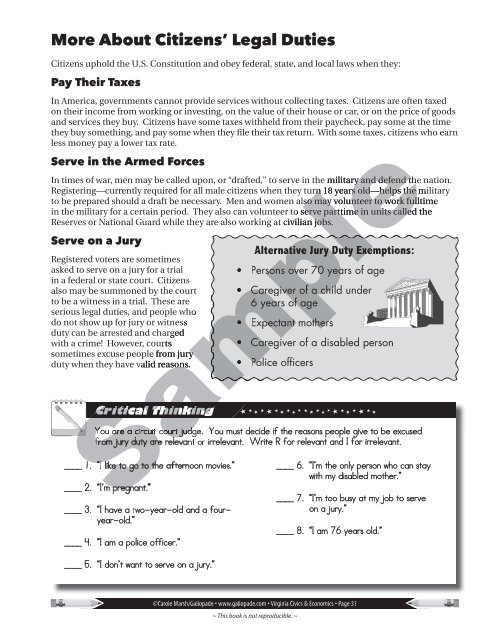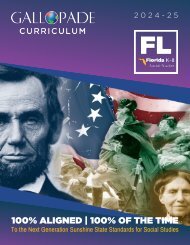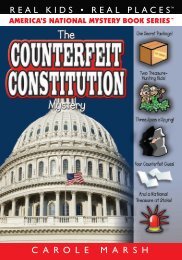Virginia Experience Civics & Economics Social Studies
The Virginia Experience effectively teaches students about United States history. All curriculum materials cover foundations of the U.S. government, citizenship, political process, understanding government, judicial system, public policy, economy, and finances as required by the Virginia Standards of Learning (SOL).
The Virginia Experience effectively teaches students about United States history. All curriculum materials cover foundations of the U.S. government, citizenship, political process, understanding government, judicial system, public policy, economy, and finances as required by the Virginia Standards of Learning (SOL).
You also want an ePaper? Increase the reach of your titles
YUMPU automatically turns print PDFs into web optimized ePapers that Google loves.
More About Citizens’ Legal Duties<br />
Citizens uphold the U.S. Constitution and obey federal, state, and local laws when they:<br />
Pay Their Taxes<br />
In America, governments cannot provide services without collecting taxes. Citizens are often taxed<br />
on their income from working or investing, on the value of their house or car, or on the price of goods<br />
and services they buy. Citizens have some taxes withheld from their paycheck, pay some at the time<br />
they Sample<br />
buy something, and pay some when they file their tax return. With some taxes, citizens who earn<br />
less money pay a lower tax rate.<br />
Serve in the Armed Forces<br />
In times of war, men may be called upon, or “drafted,” to serve in the military and defend the nation.<br />
Registering—currently required for all male citizens when they turn 18 years old—helps the military<br />
to be prepared should a draft be necessary. Men and women also may volunteer to work fulltime<br />
in the military for a certain period. They also can volunteer to serve parttime in units called the<br />
Reserves or National Guard while they are also working at civilian jobs.<br />
Serve on a Jury<br />
Alternative Jury Duty Exemptions:<br />
Registered voters are sometimes<br />
asked to serve on a jury for a trial<br />
• Persons over 70 years of age<br />
in a federal or state court. Citizens<br />
also may be summoned by the court<br />
• Caregiver of a child under<br />
to be a witness in a trial. These are<br />
6 years of age<br />
serious legal duties, and people who<br />
do not show up for jury or witness<br />
• Expectant mothers<br />
duty can be arrested and charged<br />
with a crime! However, courts<br />
• Caregiver of a disabled person<br />
sometimes excuse people from jury<br />
duty when they have valid reasons.<br />
• Police officers<br />
Critical Thinking<br />
You are a circuit court judge. You must decide if the reasons people give to be excused<br />
from jury duty are relevant or irrelevant. Write R for relevant and I for irrelevant.<br />
____ 1. “I like to go to the afternoon movies.” ____ 6. “I’m the only person who can stay<br />
with my disabled mother.”<br />
pregnant.”Sample<br />
____ 2. “I’m pregnant.”<br />
____ 7. “I’m too busy at my job to serve<br />
____ 3. “I have a two-year-old and a four-<br />
on a jury.”<br />
year-old.”<br />
____ 8. “I am 76 years old.”<br />
____ 4. “I am a police officer.”<br />
Sample<br />
____ 5. “I don’t want to serve on a jury.”<br />
©Carole Marsh/Gallopade • www.gallopade.com • <strong>Virginia</strong> <strong>Civics</strong> & <strong>Economics</strong> • Page 31<br />
~ This book is not reproducible. ~
















